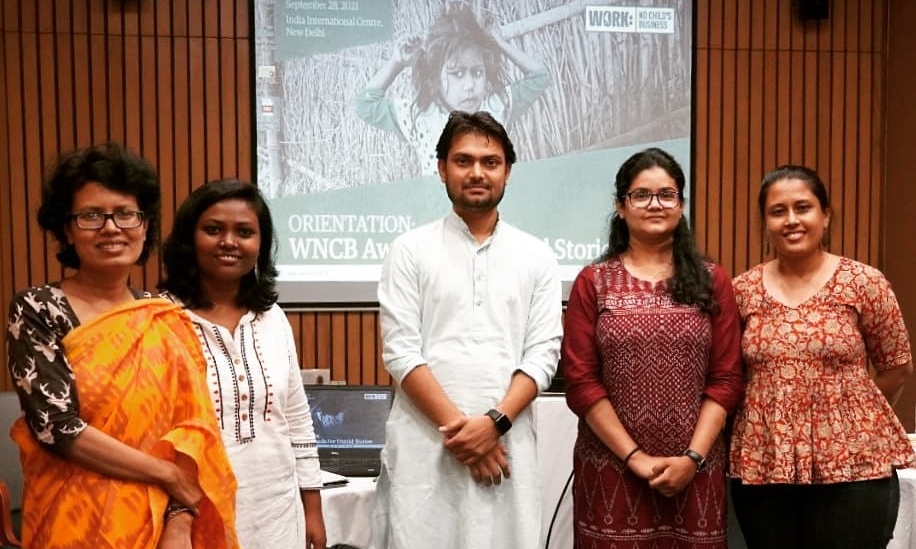WNCB India has selected the awardees of the Awards Program For Untold Stories. Through these jury-based awards, WNCB seeks to delve into and learn simple and complex facts about the different aspects of child labour in India.
Mamuni Das, Bhagyashri Boywad, Madhav Sharma, Nidhi Tewari, Aiman Siddiqui (awardees from left to right)
Mamuni Das, Bhubaneswar in Odisha
Mamuni Das has been a business journalist for over a deacde and half and worked as a Senior Deputy Editor with The Hindu BusinessLine till June 2021. She is in the process of transitioning to the development sector.
Under this grant, she intends to work on tracing the lives of missing children from Indian Railways’ platforms during the pandemic.
Many children live on and off the stations, tracks and trains of Indian Railways. She will pursue what happened to them during the COVID-19 pandemic in a series of long-format articles. The articles will understand in-depth the factors that force them to opt for the precarious lives they live on Indian trains, the patterns in the trains routes that they follow and how that altered during the pandemic. The series will also probe whether the state-support resources meant and allocated for them reached and benefited them, and whether and if there are success stories in the space which can be studied and replicated in this space.
Madhav Sharma, Jaipur in Rajasthan
Madhav Sharma is a journalist. He has worked with Rajasthan Patrika, Dainik Bhaskar in regional print media. He has done PG diploma in Radio & television journalism from Indian institute of mass communication and has a 7+ years total experience in journalism field. He mostly writes on environment, health, agriculture, political and social issues.
As part of WNCB Awards for Untold Stories, he will do a both article and video format story on street children’s day to day work, lifestyle, food and drink, and struggle for life (particularly the ones engaged in knife sharpening and selling). The decline and changes in their work will also be included in this story with the advent of technology. The report covers their health, education, nutrition, work status, family support at work and at work. Information from experts who have knowledge about the history of their society, their community will also be sought.
This will be the first story in the recent Indian media on children with knives, knives, sharpeners.
Aiman Siddiqui, Delhi
Aiman Siddiqui has proposed to work on five long-form essays in the context of child labour and child rights. The themes on which she hopes to write would range from education, labour laws, anti-trafficking bill, gender issues to child labour in the backdrop of a rising platform economy in India. She would also aim to draw a parallel between the advent of Covid-19 in India and the increasing percentage of child labour as well as the deteriorating conditions of work.
Nidhi Tewari, Lucknow in Uttar Pradesh
In developing countries like India, it has been found that children who are drawn to child labour are driven because of economic deprivation and household needs. While migration may open the door to a plethora of new opportunities for children, child migrants can also face serious risks and challenges. They are at high risk of exploitation and child labour. Child labour pushes young lives into the vile clutches of precarity, risk and mars them of their right to a healthy, prosperous future. Under the WNCB awards for Untold Stories, I shall be documenting the tales of children forced into precarious forms of child labour post migration. The impact of macro level factors such as political systems, citizenship entanglement, lingual and cultural identity struggles on the lives of children shall also be explored.
Bhagyashri Boyad, Nanded in Maharashtra
Bhagyashri has completed her MA in Women’s Studies from Tata Institute of Social Sciences, Hyderabad. She is the first Dalit woman chairperson of the Students’ Council at TISS Hyderabad in 2019-20. She has worked with Anandi as Project Coordinator on Violence Against Women and Girls, Area Network & Development, Panchmahal Dahot, Gujarat. Presently she is working as a Legal Advocacy Consultant with Good Samaritans India, Hyderbad.
Her research study titled, “Child labour and Kapada market; A socio-economic reflection” aims at analysing various socio-economic conditions such as class, caste, ethnicity and conflict as the contributing factors for increasing child labour and exploitation in Kapada market Nanded. In the scenario of increasing income divide and economic impacts due to the pandemic, many families are unable to sustain their livings, thus relegated to the margins and often the children of the particular families are forced to work. Most of these children coming from marginalized background are further exploited and stuck with low income and it leads to further marginalization. Hence this study will look at the nuanced understanding of the contributing factors which catalyse the child labour and exploitation and how the new form of education specifically digital and online education further distances children of marginalized group which forces them to work in the market.

